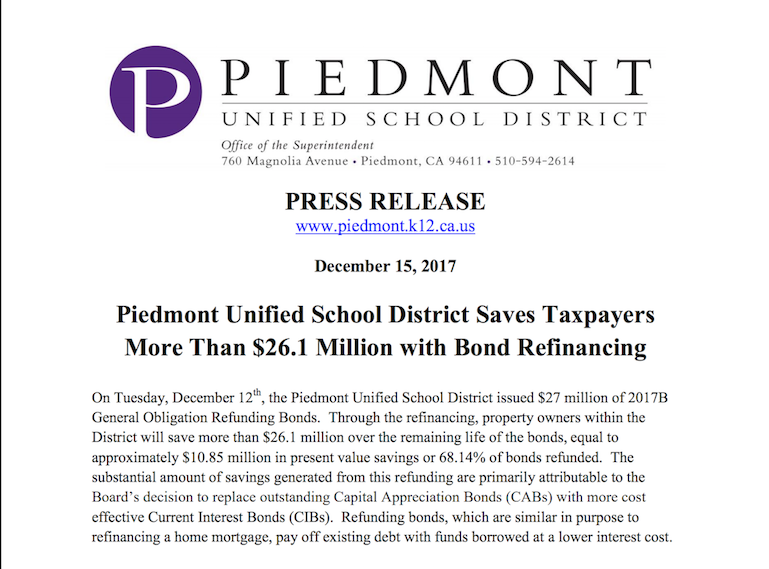
The December 15, 2017 bond refinance was very tricky in that the original 2013 bond had a 10-year no-refinance clause. The refinance required creating a parallel bond with a trigger mechanism to pay off the 2013 CAB in 2023.
Some of the savings from this refinance came from a change in interest rates but the bulk of it came from eliminating unpaid interest charges compounding from 2023 to 2043.
The easiest way to describe CABs is to think of reverse mortgages. They both came on the scene in the early to mid-2000s and involve not making interest payments that accrue on top of the principal amount borrowed in an exponentially compounding manner. This is also called negative amortization which creates additional debt to the community that does not benefit students. It is unproductive debt.
CABs are the opposite to Measure H1. Measure H1 is expensive because it improves a lot of facilities. Design and construction is productive work that will arguably improve the environment for student learning. People may disagree on whether it was worth the price tag but the fact that it is debt for productive uses was never in question.
Compound interest charges in CABs primarily benefit bond investors because it saves them the effort to find investments if we had been making interest payments twice a year (on property tax days).
How much would it have cost to finance Havens with pay-as-you-go financing scheme (i.e. fully amortizing CIBs) to begin with in 2013? Approx. $211 per year for the average assessment in Piedmont, click here for more details. That amount is too low to create an investment strategy or personally benefit from deferred taxation.
Going with a CIB to begin with in 2013 would have saved another $18.8 million in now unrecoverable compound interest charges.
Why then did taxpayers want to choose CABs? After the public became aware of the true cost of CABs, in various polls and letters to the board 95% of the respondents wanted nothing to do with CABs. In reviewing the names of of the respondents, most had exposure to my writings on CABs and independently convinced themselves CABs are predatory. Most also had kids in the district because few people without kids in the district ever got district communications regarding this financing choice that affects them as well.
It turns out that the opinion of taxpayers is not essential to a municipal entity (e.g. a school board) when it comes to refinancing bonds already on the books. In 2013, the school board issued a CAB without presenting alternatives to the public or providing notice to the public. The main person on point for the decision turned out to be a bond investor themselves who invested in the 2013 CAB and later got on the school board and will be profiting a portion of the $18.8 million from the choice of going with a CAB. With the departure of this board member, 50% of the remaining board still wants to see CABs as an option on the table every time we do new financing.
When people get a refinance of their mortgage, hardly anyone says:
I also want to see your best pitch for a reverse mortgage.
Unfortunately for CABs in PUSD the pitches have kept changing and each time have contained financial models fraught with unreasonable assumptions that were not noticed by anyone in the district or board. This created unnecessary pressure on citizen taxpayers to read through the materials, find the flaws, show up and speak up at board meetings.
Since I know CABs to be unnecessary and more costly to all taxpayers over the life of the bond, and the non-bond-investor public who is aware of these instruments doesn't want them, and these products have been discredited in the press and hardly any part of the country is issuing them anymore, it seems to me that we should make issuing CABs a very transparent process that gets permission from all taxpayers including the 60% without kids in the district. In other words, a bond election.
I am the only candidate who guarantees to tip the balance of the board against these instruments and can guarantee to use CIBs for all future financing unless we need to go to a bond election.
This would be my next contribution for protecting the community from predatory bond instruments.
